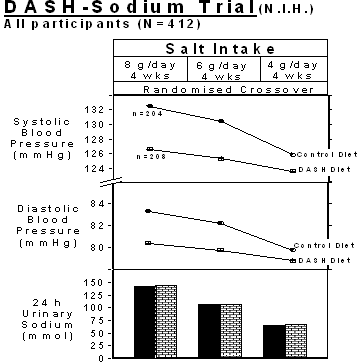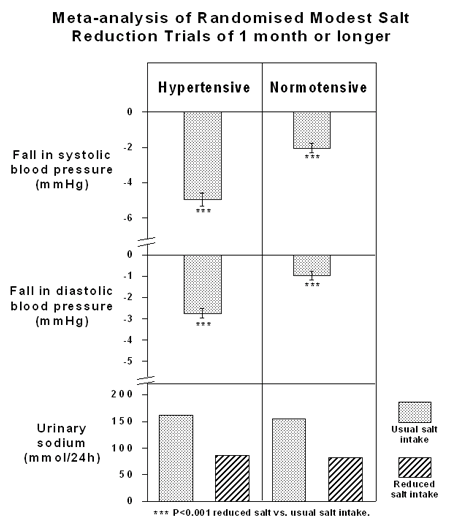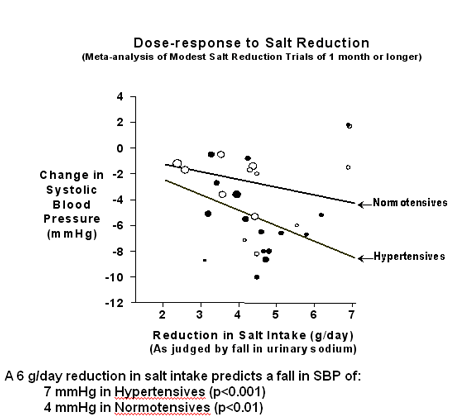治疗试验
二十世纪初的研究就已经发现对于高血压患者,限制盐的摄入会显著降低其血压。Kempner的传统研究清楚揭示了这种做法的重要作用,即使是非常严重的高血压患者,减少盐的摄入也能取得一定效果。
最近的研究发现,对于高血压患者适度减少盐摄入量(如从10-12g/天减至大约5-6g/天)取得的降压效果与单个降压药的效果等同。而且血浆肾素或血管紧张素II浓度较低的受试者血压下降幅度更大,例如非洲原住民或老年受试者。另外,适度减少盐的摄入量有助于增强药物的降压效果。
一项限盐双盲试验中,将有轻微高血压(无需治疗)的受试者分为三组,盐摄入量分别为12g、6g和3g/天,结果显示血压下降与盐减少量明显剂量相关,每天摄入3g盐的受试者血压降幅最大。另外,在一年的随访中低盐组的血压未出现升高。美国的三项长期研究同样证明,少量减少盐的摄入量不仅能降低血压,同样还能预防高血压发病,而且有可能使患者停药。(7)
一项对老年人进行的双盲试验证实,对于血压正常者,适度减少每日盐摄入量(从10g调整到5g/天)可取得与高血压者同等的降压幅度(8)。这说明减少盐摄入量在预防这类老年人脑卒中方面潜力巨大,这些老年人处于正常偏高的血压范围,极易出现脑卒中。
最近,一项饮食控制对照试验---DASH Sodium 研究---明确证实,不管是高血压者还是血压正常者,减少盐摄入量可以显著降低血压,而且重要的是,血压降幅与盐减少量存在剂量依赖关系。另外,采用DASH饮食(水果蔬菜较多,饱和脂肪较少的一种饮食)的一组患者进行限盐后,其血压会出现进一步下降。该研究之所以重要是因为该研究表明,不仅减少盐摄入有利于降低血压,而且限盐联合多吃水果蔬菜、减少饱和脂肪摄入会加强降压效果。(表1,文献1)
表一. DASH-Sodium研究中单独控制盐摄入量与限盐联合DASH饮食在高血压及血压正常者中的降压效果
|
Hypertensives (n=169) |
Normotensives (n=243) |
Salt restriction alone |
8.3/4.4 mmHg |
5.6/2.8 mmHg |
Salt restriction + DASH diet |
11.5/5.7 mmHg |
7.1/3.7 mmHg |
虽然DASH Sodium研究及很多双盲对照试验结果明确,但围绕适度控盐对“正常或平均”血压者的影响方面仍存有争论。对一系列关于血压正常者的研究进行荟萃分析发现,控制盐摄入量会使其收缩压出现轻微但持续的降低(9)。最新两篇关于限盐对血压影响的荟萃分析表明,虽然血压正常者的血压也出现明显下降,但根据作者的观点,尚不足以造成公共卫生影响(10, 11).
对两项荟萃分析进行细致比较,结果发现,加入很多有关血压正常者的研究后分析结果就出现严重漏洞,这些研究中盐摄入量控制只维持了5天,而且五天内的盐摄入量降幅过大(如从20g/天降至0.5g/天)(12)。这样会刺激交感神经系统,并激活肾素-血管紧张素系统。这种非常短暂但急剧的减盐研究在公共卫生指导方面意义不大,公共卫生提倡的是适度减少盐摄入量(从10-12g/天降至5-6g/天),而且任何一种药物的降压效果也绝不会仅凭五天的治疗来进行判断。

Figure 1. Changes in blood pressure and 24 h urinary sodium excretion with the reduction in salt intake in all participants (hypertensives: n=169; normotensives: n=243) on the normal American diet (i.e. control diet) and on DASH diet. (Redrawn from Ref. 4 ).
最新的一项荟萃分析只讨论了一个月长短的研究试验,而且只包括那些与公共卫生建议类似的适度减少盐摄入量的研究。结果表明,适度减少盐摄入量,不管是高血压者还是血压正常者,收缩压和舒张压都出现明显下降。 (9) (Figure 2).

Figure 2 . Effect of modest salt reduction on blood pressure in hypertensive and normotensive individuals in a meta-analysis of 28 randomised controlled trials of 4 or more weeks. (Note average salt intake was reduced from 10 to 5 grams/day). (Adapted from Ref. 9).
该荟萃分析同样表明,两者存在剂量相关性,盐摄入量减少6g,血压正常者的收缩压下降4.0mmHg (13) (Figure 3).

Figure 3 . Dose-response relationship between the reduction in salt intake as judged by reduction in 24h urinary sodium and systolic blood pressure. (Adapted from Ref 9).
根据荟萃分析得出结论,盐摄入减少6g/天引起的血压下降,可使脑卒中死亡率减少24%(四分之一),缺血性心脏疾病死亡率减少20%(五分之一)(13)。在英国脑卒中或心脏疾病患者约半数死亡,大约为6000万人,相当于每1000人中有10.13人死亡,而每年死于心血管疾病的人数也高达24万。全球人口的平均年龄约为24岁,而英国为39岁。随着人口平均年龄增加,出现心血管疾病的人口比例也将随之增加。
荟萃分析中的大部分研究都提到,研究仅进行了一个月,若长期控制盐的摄入,效果会更大,尤其是限盐还能预防或减缓血压随年龄增长的升高速度。荟萃分析同样也可能低估了血压下降率,正如DASH Sodium对照研究及其他限盐双盲对照试验显示的那样,受试者血压降幅远大于荟萃分析结果。
参考文献